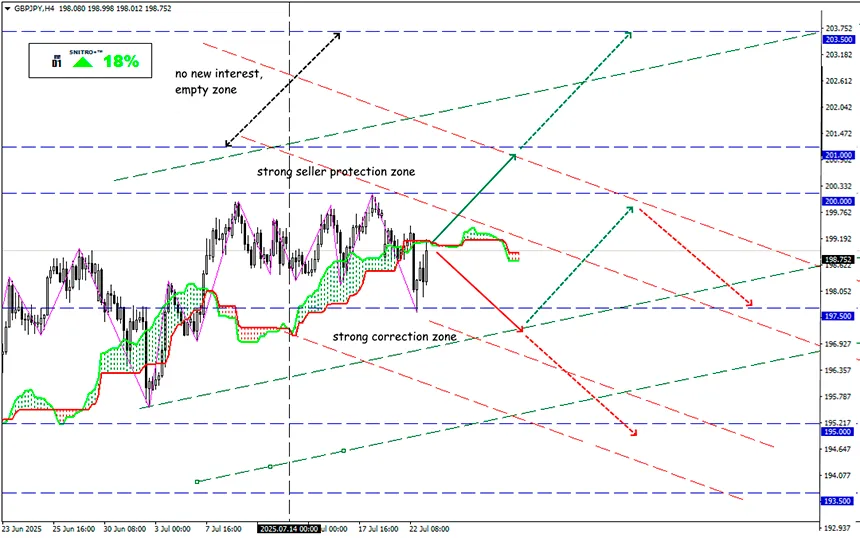Mission accomplished: Japan has capitulated

#GBPJPY
Key zone: 197.50 -199.00
Buy: 199.50 (on a strong positive foundation); target 201.50-202.00; StopLoss 198.80
Sell: 197.00 (on a strong breakdown of 197.50); target 195.50-194.50; StopLoss 197.70
Most Asian currencies are strengthening amid a weak dollar after Trump’s statement on the conclusion of tariff negotiations. However, investors in Japan are focused on political uncertainty following the ruling coalition’s defeat in the upper house elections and growing speculation about Prime Minister Shigeru Ishiba’s resignation. This issue remains a priority.
Washington and Tokyo have signed a large-scale trade agreement that includes a 15% tariff on all imported Japanese goods (Trump wanted more than 25%), but this should not be seen as a positive development.
Under the terms of the deal, Trump secured massive Japanese investments totaling $550 billion into the U.S. economy, but gave no details—who exactly will invest, under what structure, or for how long. In any case, Japanese markets are opening up to American exports, including automobiles, agricultural goods, and energy products. Trump claims it will create “hundreds of thousands of jobs,” but Tokyo has yet to confirm this.
There are no public details of the agreement.
It is still unclear whether Japan will receive an exemption from the current 25% tariff on car and parts imports to the U.S. The automotive sector is a key part of Japan’s economy and represents the bulk of its $63 billion trade surplus with the U.S. Chief negotiator Ryosei Akazawa held eight rounds of talks with U.S. Commerce Secretary Luttick to secure such preferences, but apparently without success.
The fate of Japan’s exemption from the 50% U.S. tariff on steel and aluminum imports is also unclear.
P.S. 15% tariffs, investments, and mandatory U.S. product purchases—this looks like plain financial extortion. Tokyo is paying tribute to America just for access to the U.S. market and (possibly!) for NATO participation. Still, if these 15% remove all current and future cross-sector tariffs, it might actually be beneficial.
Of course, agreements always include terms not open for public discussion, such as currency regulation, tariffs on Chinese goods, etc. But one thing is clear—the yen will suffer.
For now, the Japanese currency is moving most steadily within cross-rates, especially since the euro and British pound are under similar pressure.
So we act wisely and avoid unnecessary risks.
Profits to y’all!

















